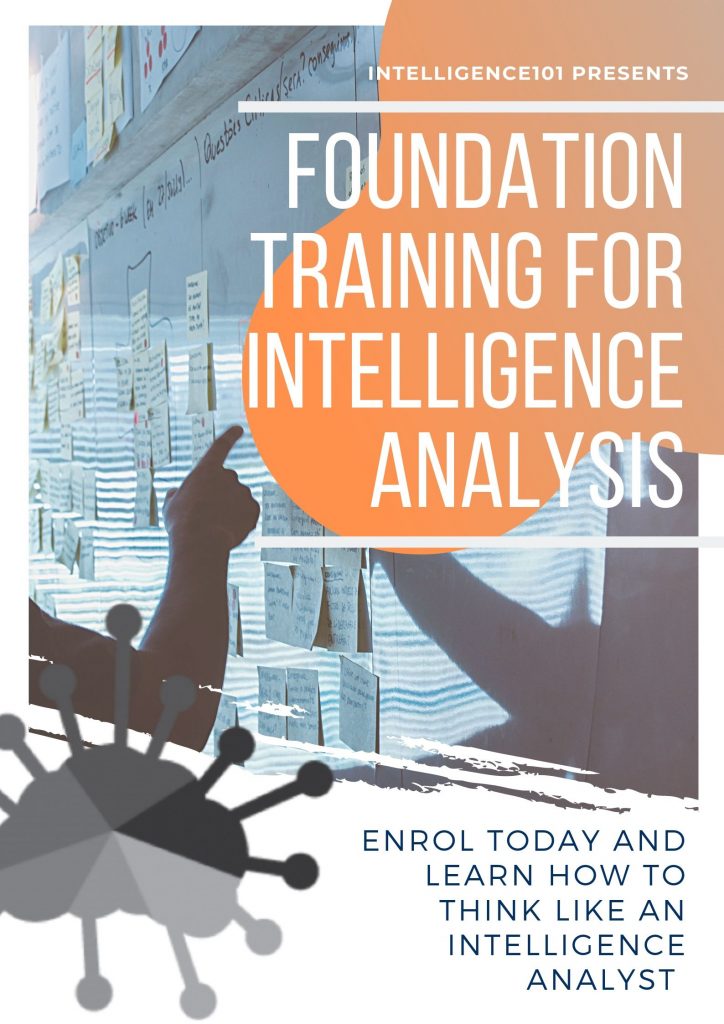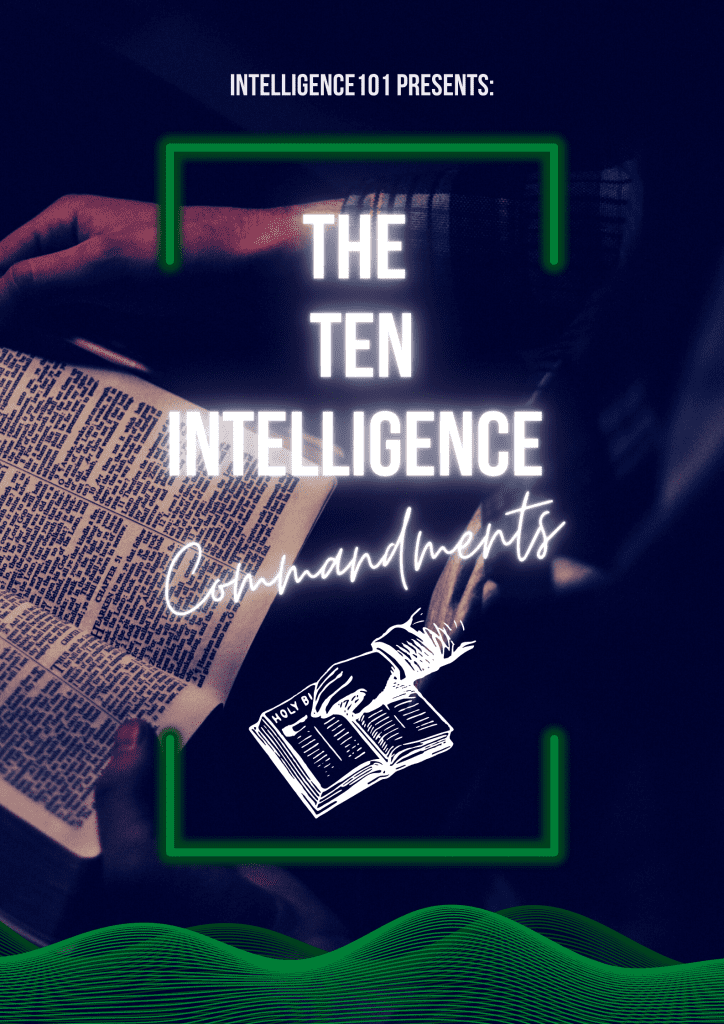What is your question?
As simple as it sounds, if you don’t know what you don’t know, you’re going to be hopelessly lost before you’ve even started. Quite simply, the most important thing is to hone in on your problem, and frame it in a simple to approach the question.- Should ANTIFA be classified as a terrorist organisation?
- Do anti-consorting laws actually have an effect on Outlaw-Motor Cycle Gangs?
What should you promise your customer?
Answer: A solution. An intelligence brief is not a tick-box exercise. Your job is to define the problem so clearly that the customer can determine the best solution. If your customer is left wondering you’ve not solved the problem. So then it’s back to the drawing board.Less is more.
Intelligence assessments will often morph and grow. As you research and design the assessment it’s easy to get swept up in the hype and try to stuff as much text, images and mapping into a single PowerPoint slide as you can. Don’t over-egg the pudding. If it feels like you’re getting off-topic, or shifting the purpose of the brief, just park that element and pick it up later.Your personal image matters (so does your reputation).
We have an old saying in the Intelligence game, you’re only as good as your last assessment. And so, you need to remember, your image will be constantly called into question by your audience. For example, if you’re a lazy or inept analyst, you can bet your assessments will be viewed with the same level of criticism.Tell them something they don’t know.
Otherwise, what’s the point? Your job isn’t to confirm what they already know, it is to provide timely and accurate Intelligence that actually informs decisions. So, you need to tell them something they don’t know – and it needs to matter! Otherwise, you may as well be reporting the news.Imagination is key.
You’ve probably heard the age-old debate about whether Intelligence more Art or Science. Well, every good analyst must have a creative side. Don’t be afraid to chase an imaginary rabbit, free your mind to explore creative solutions – let the artist in you flourish.Don’t be a bore.
There’s no nice way of saying it. But no one enjoys listening to the incessant mono-tone droning of a boring Intelligence brief. Learn to tell a good story and involve the customer in the story. Use their experience, draw references they’ll know and take them on a journey.Make sure it’s actionable.
If there’s no point to it, then there’s no point. Give the audience something to take home, something to use and something to do. Make your work matter by adding in a rousing call to action – even if it’s just to rouse more collection.Don’t pull your punches.
Intelligence analysts are advisors, so make sure you advise! Don’t shirk your responsibility by telling the customer what they want to hear, or agreeing to their opinion because it’s a safer option. If you disagree, own it.Know your audience, and where they’ve been.
It’s best to know who your audience is, and their experience. Do your homework, and speak to their reference points – you’ll create a deeper connection and allow your assessments to bind with their experience.Bad news doesn’t get better with age.
Always give it to them straight.New leadership needs to come correct.
Time and time again I’ve seen bullish new leadership come rushing in with a raft of ideas, keen to make their mark on the organisation. Often promises of a ‘revolutionary new system’ or ‘improved processes’ shine as bright as a magnesium trip-flare only to fizzle out after thirty seconds. You need to learn the systems, learn the processes, and understand the people before determining the best way forward. The best way to achieve buy-in is by understanding the problem and serving the customer. Don’t be so quick to reinvent the wheel.Not my monkey, not my circus.
Know what you can control, and own it. Accept what isn’t yours and do your best to play in the sandbox you’re in.A picture is still worth 1000 words – maybe more!
Don’t use words when you could use a picture. Develop the skill to present without text, use supporting images or props to tell your story. Learn to utilise programs (like Canva) and build slides, images and graphics that tell a story for you.Give examples.
We all learn through shared experience, so give examples. It’ll help others learn.Provide time for questions.
Always allow time for feedback and questions, take every opportunity to satisfy questions, and deliver more value in every answer.Accuracy, Brevity and Clarity.
Consider what you need to say, and what can wait for questions. Provide a summary and keep the detail, you can always elaborate later.Ghetto Done.
It doesn’t have to be perfect. But it does have to get done. If an email achieves the outcome then get typing, if a phone call will suffice…then pick up the phone. Get the info to where it’s needed. Keep it ghetto, and get it done.If you can’t write it, just say it.
Don’t waste your time right-clicking and using the MS Word Synonyms just to sound smarter. Say what you’re thinking in the clearest possible way. If you can’t write well – just say what you’re thinking.The ‘so what’ factor?
Every point should matter. Every statement should have a ‘so what?’ relevance. Always ask yourself, So what? What does it mean?Fight for information.
Information isn’t always going to just come to you. Good intelligence analysts know they need to fight for information, which means asking questions, finding resources and getting after it. Develop your network, and if you cannot answer a question, ask around – ask who might and don’t be afraid to pick up the phone until you get what you’re after. This alone separates good analysts from the average.Follow up, don’t make it up.
It’s more than acceptable to not know something. You’re human, you’re not expected the know everything. What is unacceptable is to make up an answer. If you don’t know then just say you don’t know. You won’t be crucified. When it’s all said and done, find out and follow up.Keep it factual.
Keep your emotions in check. Decision-makers need you to present facts, findings and clear assessments. Try to remove ‘you’ from the assessment and deliver the information without emotion.Keep the main thing the main thing.
The quality of your intelligence depends entirely on the focus of your question. Maintain your focus.Is this everything you’ve learnt?
Not at all. These are simply a handful of the lessons that apply across the spectrum of Intelligence Operations. If you desire to become an intelligence analyst or want to learn the skills needed to turn everyday information into Intelligence – I’ve developed a separate and specialised course just for you.From Information to Intelligence
Would you like to:- Develop a comprehensive knowledge of the Intelligence Cycle and the Foundations of Intelligence Analysis?
- Learn how to make Intelligence collection plans and write Intelligence Briefs?
- Understand Intelligence Collection methods including HUMINT, SIGINT, IMINT, GEOINT, and OSINT?
- Compile Strategic Analysis and deliver Oral Briefings?
- Apply your Intelligence training to different roles and environments including Law Enforcement, Military, Counter-terrorism?
- Develop your critical thinking and learnt to use various analytical methods?
- Understand the impact of Intelligence in multi-disciplinary roles?
- Then join us in our interactive Intelligence Training Course today.






